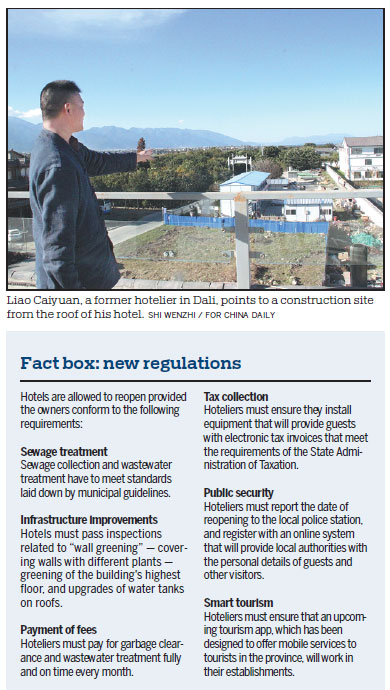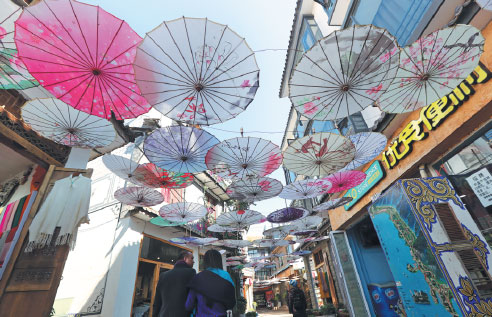Cleanup pours cold water on hoteliers' dreams
A program to guard the environment around Erhai Lake, a popular tourist attraction in Southwest China, has resulted in loss of income and business closures. Li Yingqing reports from Dali, Yunnan, with Zhao Yimeng in Beijing.
At the end of March 2017, more than 2,000 restaurants and hotels in a popular tourist spot in the southwestern province of Yunnan were forced to close for at least a year. The shutdown was part of a local government campaign to improve water quality in Erhai Lake, the second-largest freshwater body in the province.
The Dali Bai Ethnic autonomous prefecture, where the lake is located, became a popular tourist attraction after Breakup Buddies, a romantic road comedy set in Dali, hit box offices in 2014. City dwellers began to regard the lake as a quiet bolt-hole from their crowded, busy lives, and the local scenery and nearby Cang Mountain range matched their expectations of Utopia.
To deal with the environmental damage that resulted from the rise in visitor numbers and the proliferation of hotels and restaurants, thousands of establishments were ordered to close until they conformed to new regulations related to the environment and business practices (see fact box).
Though most of the hoteliers are in favor of the clean-up campaign, many are dismayed by the revenue they have lost and the more competitive market they now face.
Deciding to quit
Before he moved to Dali and opened a hotel with his wife in 2013, Liao Caiyuan had drifted around Beijing for eight years.
"I love Dali, not only for its beautiful environment, but also the unpretentious lifestyle," the 46-year-old said.
Family issues forced Liao to sell his hotel in 2015 and return to his hometown in Jiangxi province. However, nostalgic for Dali, he returned in September 2016 determined to open a new hotel with a view of the lake. In November the same year, he signed a contract to rent a property for 18 years.
He named it Dali Love Inn, because he wanted it to remind guests of the early days of their romance. He also had a fresco painted on the exterior wall relating a local romantic tale.
"The happy ending of the fresco means that wonderful things always happen when we forget our troubles," he said.
The hotel had a soft opening during Spring Festival 2017, but even in the first weeks of operation, Liao heard rumors that the local government was planning to close a number of establishments temporarily.
On March 31, 2017, the prefectural government announced that a central preservation area had been established, and all hotels and catering establishments within the zone would have to suspend activities so their business and environmental certificates could be checked.
As a result, about 2,000 hotels around Erhai Lake were closed, including Dali Love Inn.
"I felt desperate when I leafed through the document. It was as unpredictable as winning the lottery," Liao said. "We harbored hopes of reopening quickly. Who could have predicted that we would have to close for more than a year?"
In the early days of the shutdown, he was so despondent that he killed time by watching movies in the hotel. Inspired by success stories in the films, he often dreamed of reviving his business, even though he knew that would not happen.
However, a backpacking holiday with his children during their school's summer vacation restored his good humor and prompted him to investigate other opportunities.
He visited Guizhou province to assess the growing tourism market, but a lack of funds forced him to return to Dali. Meanwhile, when livestreaming became fashionable, he undertook basic camera and technical training and opened his own account.
His livestream found few fans, so he quickly dropped the idea. Eventually, to make ends meet and repay debts, he tried his hand as a tour guide in Thailand and sold goods in Vietnam, before returning to China and working as a driver for Didi Chuxing, the country's version of Uber.
During July and August, the high season for tourists, he allowed the relatives of some friends to stay at his hotel secretly, charging them 30 yuan ($4.40) a day for utilities.
On Aug 22, Liao was detained by the police for 10 days for illegally receiving guests. It was during this period of detention that he first considered quitting the hotel business.
On Sept 19, Dali Love Inn reopened, having been granted the necessary certificates. Liao began preparing for an influx of guests during the upcoming "golden week", China's National Day holiday in early October. However guest numbers were far lower than he had anticipated.
As a result, he decided to transfer management of the hotel to a third party and search for other opportunities in Thailand or Dubai.
"I love Dali, but I came here for the lifestyle, not just to run a hotel. The hardships forced me to leave, but I guess I may find myself at ease with this failure when I look back on it," he said.
A sliver of hope
The Lemon Tree Inn in northwestern Dali's Shuanglang township, which lies on the shore of Lake Erhai, reopened on Oct 1. Although it is a high-end hotel with a view of the lake, only a few guests stayed there during the National Day holiday.
Wu Xin, a 30-year-old receptionist at the inn who arrived in Shuanglang two years ago, has witnessed the dramatic development and sudden reversal of tourism.
Generally, October is the low season for tourism in Yunnan. The only exception is the area around Erhai Lake, where hotels that offer a view of the water usually enjoy healthy occupancy rates. Last year, however, things were different and most hotels were empty.
"The new regulations are devastating for the hotel industry. There are many ways to control pollution, but the closure of our hotels should be the last resort because it is ruining our future," Wu said.
The uncertain market and the demands of the new policies have seen many hoteliers sell up, scrambling to get decent prices for their establishments.
"Even though we all feel pessimistic about the future, some people harbor hopes of restoring their businesses," Wu said.
The streets of Shuanglang were once packed with bars full of tourists, but now only four or five are still open, catering to about 12 customers a day. One bar owner, a native of Northeast China, said he was concerned about falling revenue but he hoped the downturn would only be temporary.
Hard revival
Before Dali's tourism boom, residents of Jinsuo Island in Erhai Lake made a living by fishing. When tourists began arriving in large numbers, they saw a chance to make more money and raise their living standards.
When the government ordered the closure of all the hotels on the island, their businesses were severely affected.
The first hotel on the island was opened by Xu Feilong and two friends who came to Dali from Fujian province in 2013, attracted by the scenery.
According to Xu, tourism developed rapidly after 2015, and people flooded to the island, meaning there was no need to advertise. Soon after opening, the hotel was always 70 percent full, and he had to start a booking system to avoid turning away hopeful guests.
"We have invested 10 million yuan in the hotel. When we started in 2013, we expected a payoff in five years but only 25 percent of the outlay has been recovered," he said, adding that he was shocked by the effect the new regulations have had on the island's hotel trade.
"I would never have imagined that all the restaurants and hotels would be closed suddenly because of a few pieces of paper."
During the 18-month wait, Xu stayed in Dali and prepared to reopen. In September, he applied to obtain the requisite certificate, while refurbishing the premises and upgrading the fire alarm system to meet the new standards.
The hotel reopened in October, but despite a number of discounts and promotional activities, the occupancy rate has stubbornly remained at 20 to 30 percent.
Though disappointed, Xu still supports the government's decision. "Local residents and entrepreneurs will benefit from the protection of Erhai Lake in the long run. After all, who will visit if it is polluted?" he said.
By the end of last year, 1,806 households within the original protection zone had been relocated, laying the foundations for an ecological corridor to be built around the lake, according to Dali TV.
To compensate those involved for the closure of their businesses and loss of revenue, the local government has brought in a third-party assessor to evaluate the losses and calculate the funds required to open new hotels. When the work has been completed, the government will award a lump sum, and the hoteliers will decide between themselves how the money will be divided.
Contact the writer at liyingqing@chinadaily.com.cn
|
Hotels in Shuanglang township, Dali, Yunnan province, prepare to welcome tourists for Spring Festival.Provided To China Daily |

(China Daily 01/18/2019 page5)



















